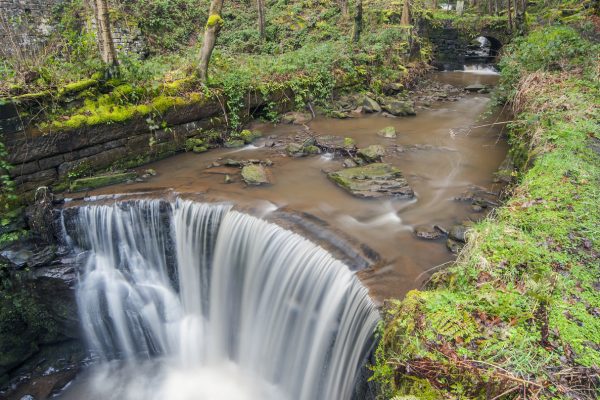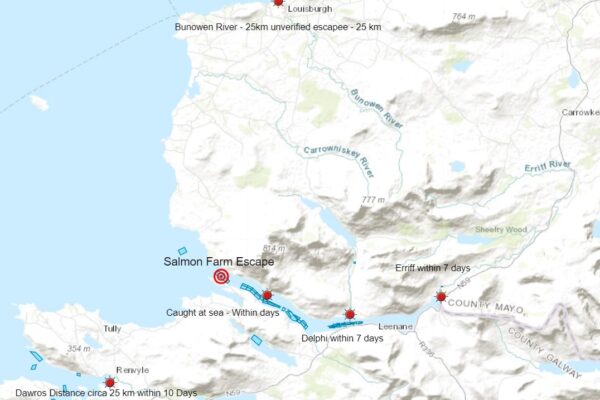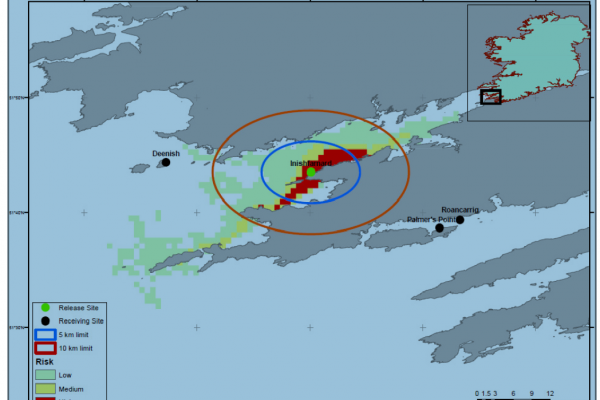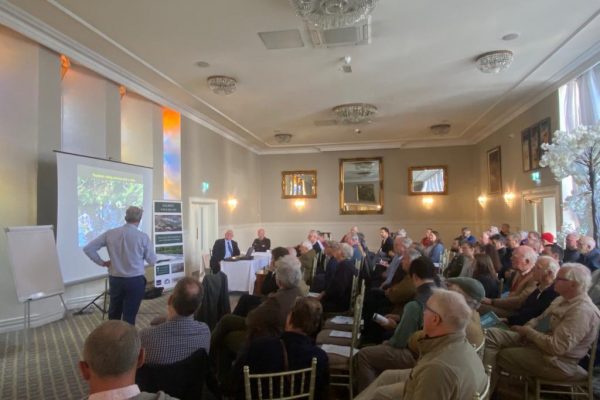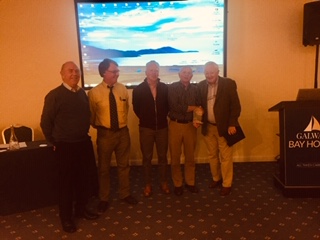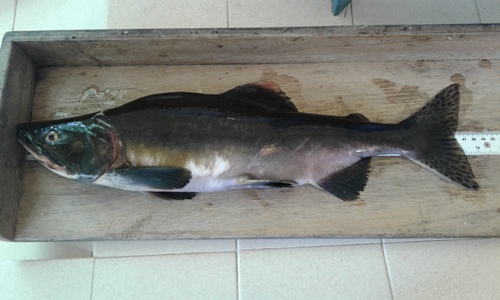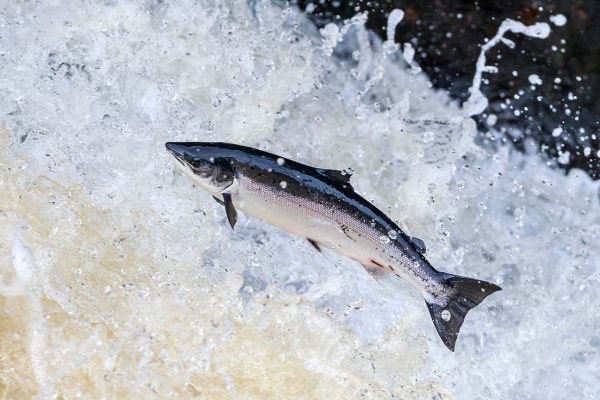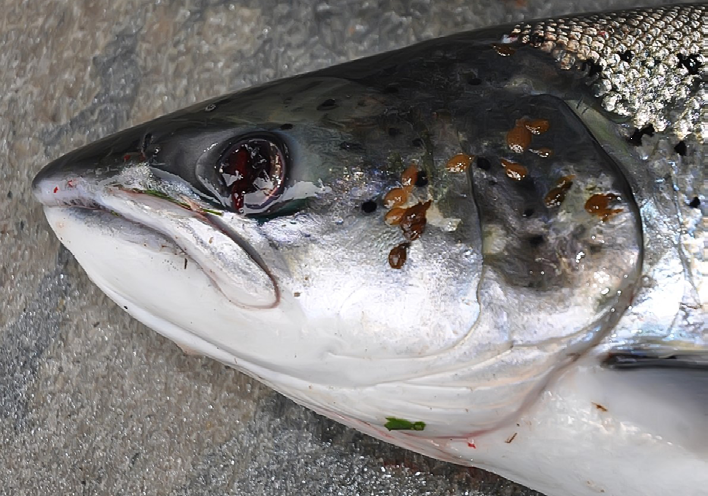-
Fish Kills – Ireland –
This is a most revealing report and should be studied to ascertain trends evident in data. It must also be stressed that diffuse sources from agriculture are probably the biggest threat to rivers and lakes which requires a change to macro policy concerning agriculture. Finance can go a long way to upgrading and replacing urban waste water infrastructure. The overuse of water in Ireland is alarming with all water from houses and industry being discharged to treatment plants. The older plants also receive storm water which has certainly increased with climate related issues. This study gathered and digitised data from 2107 fish kill events in Ireland, spanning more than 50 years from 1969 to 2022. Spatial data was available for 1738 fish kills. • The number of reported fish kill events has decreased since reporting began in 1969 especially when compared to the high levels of the 1980’s. • Four phases of fish kills occurred in Ireland since 1969. The worst years for reported fish kills were in the 1980s, particularly 1984, 1987 and 1980 respectively with a total of 347 fish kills recorded. Since 1992 there has been a downward trend in reported fish kills. The peak in fish kill reports in the 1980s coincided with an intensification of agriculture in Ireland. Despite the downward trend since about 2012,there have been several relatively high numbers recorded, mainly coinciding with the occurrence of heatwaves and droughts. • Fish kills were more prevalent during the summer months, when warm weather and low water levels exacerbated potential underlying problems within a channel. • Common causes included agriculture, eutrophication, industry and municipal activities. • Fish kill events were less frequent in the west and northwest and hotspots were particularly prevalent in the east, south and the north midlands probably coinciding with intensive agricultural activity and large urban centres. • Fish kills occurred in every county since 1969. Counties Cork and Cavan had the highest proportion of fish kills, while Co. Roscommon and Co. Westmeath had the lowest. • In the 1970’s the highest number of fish kills (where spatial data was available) was reported from Co. Tipperary and in the 1980s from Co. Cork. In the 1990s and 2000s, Co. Cavan had the highest, and in the 2010s it was Co. Cork. Since 2020, the highest number has been recorded in Co. Cavan, followed by Co. Cork. • Since 1969, the Erne Catchment (Hydrometric Area 36) had the highest number of reported fish kills. This was followed by the Lee, Cork Harbour and Youghal Bay (Hydrometric Area 19), the Barrow (Hydrometric Area 14), Suir (Hydrometric Area 16) and Liffey and Dublin Bay (Hydrometric Area 09) catchments. • Across IFI’s fishery regions, the Eastern River Basin District (ERBD) had the highest number of fish kill reports during the study period. Two river sub-basin waterbodies in the ERBD (Avoca_020 and Avoca_010) had the highest number of fish kill reports. The Erne_080 (NWRBD), Feale_090 (ShRBD), Barrow_140 (SERBD) and Cavan_010 (NWRBD) were also among the top six sub-basin waterbodies with the highest number of fish kill reports. • Rivers were the most impacted waterbody followed by lakes. Read Full Report:Full Report Read More
Continue reading -
Update -Escapee Salmon on the move and fast: Farmed Salmon Caught Owenmore River
Reports coming in of farmed salmon caught on Owenmore River which is over 70 km from Killary within seven days. Is this fish from Killary or has there been another escape? Escapee salmon from Rosroe salmon farm in Killary have migrated long distances over the last ten days. These fish which have compromised genetics and may in time breed with wild salmon should at all costs be removed by any means possible. These fish have been caught both in the sea by anglers fishing for mackerel but more alarmingly have entered rivers both within Killary Harbour and further afield. Some have traveled over 25km north to the Bunowen and south as far as the Dawros system. These fish are being caught in these systems by anglers and should immediately be killed and reported to Inland Fisheries Ireland. The operator of the farm has suggested that these fish may not mature until 2025 but little is known of how they develop when released into the wild and thus may pose a risk this spawning season. There are many small rivers with unique genetic salmon populations and these are at high risk of damage by escapees through interbreeding. Disease may also pose a risk to all wild salmonids both near and far. There is every risk that the escapee salmon will continue to migrate and pose a risk to populations along the western sea board. There are a number of rivers within the area which are part of conservation areas which have wild Atlantic salmon as a qualifying interest and this highlights the unacceptable risk posed by open cage farming. There is no safe way to protect wild salmon if these farms are not moved onto land.
Continue reading -
Kenmare Bay – Disregard for Special Area of Conservation
Kenmare Bay is located in the South West of Ireland and is home to two currently operating salmon farms (Deenish and Inishfarnard) owned and operated by MOWI. There are two other farms within the bay which are not currently operating with a further application pending for another site near Inishfarnard. The farm at Deenish was ordered to close in April 2019 but has continued to operate pending the outcome of an appeal which has yet to be determined. This situation is appalling considering that five years have elapsed without any sign of determination. The farm has been allowed to continue to the detriment of the once famous sea trout fishery in Waterville. This fishery had the potential to generate up to three million euro for the local economy but is essentially now derelict with little if any angling tourism in the area. Make no mistake this fishery can be returned to a vibrant fishery with economic prosperity returning if salmon farming is removed from Kenmare Bay. No sea trout fishery has ever survived along side open pen salmon farming and Waterville is no exception. This situation is completely mirrored in the west of Ireland, Scotland and Norway. It is worth noting that when the farms in Kenmare Bay were closed in the period from 2004 to 2009 there was a substantial increase in sea trout numbers and a rebalancing of the population through all age groups. Waterville is home to genetically distinct sea trout and are a national asset which has been effectively destroyed by salmon farming. In 2023 MOWI applied for a renewal of their expired licences for Deenish and Inishfarnard and this is under examination by the Department of Agriculture, Food and Marine and is awaited with interest by all. There were a significant number of objections to these applications so we await determination but we expect this may take some time if previous experience is anything to go on. We would like to draw your attention to our submissions regarding the renewal applications and feel free to extract information to bolster your understanding of the issues surrounding salmon farming in Ireland. Inishfarnard Submission Deenish Submission
Continue reading -
Opening Remarks AGM – Salmon Watch Ireland
Welcome to Salmon Watch Ireland’s AGM for 2023 being conducted by Zoom. This meeting is primarily held to conform with our obligations under the Companies Act. 2023 was again a year primarily dominated by our Judicial Review on the decision to award an aquaculture licence to MOWI in Bantry Bay. Having taken the decision to enter into this legal process it was necessary to devote a considerable amount of time to research our main avenues of approach to the legal process. The Judicial review took place in April/May and was a very complex case involving three separate parties taking the review namely IFI, SWIRL and Sweetman and others including FISSTA. The judgement is still outstanding, and we are certainly concerned at the time period this judgement is taking to finalise. We certainly agree that the hearing of the case was exceedingly fair and indeed comprehensive with all parties given a fair hearing. The judgement is listed for mention again in October, but we may see a judgement at a date earlier. I would like to thank all our directors and indeed our members and supporters who helped to prepare and support us both financially and with advice which enabled us to pursue this case. The 2023 salmon run in Ireland was extremely poor with regard to both grilse, and spring salmon. Certainly, it is probable that it was the lowest return in the time series. It will be interesting to see how this will be reflected in catch statistics and indeed how the fish counter report might illuminate and reinforce our view of stocks. It is also interesting that spring stocks in 2024 suggest extremely poor returns which feeds into the narrative that linkage exists between grilse and MSW stocks in regard to survival at sea in first year. The return of salmon to Ireland is in a very precarious position with stocks now at 10% of historic highs. This is also reflected in most countries supporting Atlantic salmon stocks with UK and Norway showing a similar decline. There is also evidence that the decline in perceived strongholds like Iceland and the Russian Federation is now accelerating and showing a similar worrying trend. The scale and basin wide declines are consistent with oceanic influences which may be related to warming SST which can and does have cascading influence on currents and productivity at sea. It is also worth noting that Baltic salmon saw a dramatic decline in 2023 which would certainly be remote from Atlantic influence, so a climate explanation is suggested. There is also a suggestion that unregulated high seas fisheries directed at Atlantic salmon may be occurring but evidence of this is currently not reliable, but areas of concern are North of Faroes and South of Greenland. These areas are consistent with fisheries for salmon which were carried out by the Faroes and Greenland during 1970s and 1980s. However, the evidence of these fish coming to market is not available. We do know that there are complex reasons which dictate strength of salmon populations but with a background of practical elimination of legal harvest it is not beyond the possibility that other illegal directed fisheries have grown in international waters. This must be investigated by NASCO and must include a directed and well-resourced program going forward. The newest threat to Atlantic salmon is certainly the vast and continuing expansion and strengthening of the pink pacific salmon presence in the North Atlantic. While these fish would appear to present difficulties in freshwater, we would suggest that vast populations of these fish are now at sea in Northeast Atlantic and certainly will further compete with all species in traditional feeding areas for Atlantic salmon. There is anecdotal evidence that pink salmon have reduced other pacific salmon populations through competition in North Pacific. Coming closer to Ireland it is quite evident that we have enormous problems in regard to water quality and other issues related to loss of biodiversity. It is alarming that the regular updates on water quality by the EPA usher in a consistent and robust denial of the role that agriculture plays. The agriculture lobby is strong politically but the derogation situation in regard to organic nitrogen limits will have to be discontinued and SWIRL will be actively promoting its removal. The spectre of lack of investment by the state in wastewater infrastructure is now coming to a head with a renewed investment in housing with consequent overload of already inadequate treatment plants.Again, SWIRL will be seeking to empower local communities to make observations on planning to seek proper and reliable infrastructure. We have also continued to engage in regard to open cage salmon aquaculture with a large number of submissions in regard to renewals of expired licences. We also are still awaiting a determination of our EU complaint against Ireland in relation to legislation surrounding salmon aquaculture. The issue of mortalities on Irish salmon farms has been consistently mentioned and is outside international norms which is certainly reflective of an industry which should never be operating in Irish waters. Mortalities and disease are certainly indicative of a dangerous near coastal environment which has the probable outcome of many negative outcomes for wild salmonids. SWIRL again has been at the forefront in calling for exploitation being reduced substantially. The commercial harvest of salmon is certainly not consistent with low stock levels and needs to be dis-continued while more protection of salmon from over harvest by other stakeholders is a necessity. Directed conservation is required with larger fish requiring more protection. We still view the allocation of ten tags as being over generous in times where salmon stocks are at such low levels. We have consistently not called for mandatory catch and release in rivers with a surplus, but we certainly cannot be happy in a situation whereby certain stakeholders may be compromising the calculations through inaccurate returns. Accordingly, we have made suggestions on how the process can be improved to increase accuracy. It would not be incorrect to suggest that very few salmon catchments are managed in an effective way. We need a situation where properly resourced management structures on rivers lead to a better outcome for the resource.To this end SWIRL has taken a strategic evaluation of our focus going forward and have decided to endeavour to empower local communities to act in the interests of salmon conservation through practical actions facilitated by resources provided by us. We again facilitated an annual conference and awarded the Salmon Hero Award for the excellent and ongoing work on the Suir Tributaries. The award is in recognition of local community involvement in preserving local salmonid populations through practical actions. These annual conferences serve as a very important information resource to which all stakeholders can engage in and will certainly be continued and expanded. ENDS.
Continue reading -
AGM Remarks by Chair John Murphy
Remarks by John Murphy, chair of the board of Salmon Watch Ireland CLG, to the company’s annual general meeting on Monday 19th June 2023. Welcome to Salmon Watch Ireland’s AGM for 2022 being conducted by Zoom. This meeting is primarily held to conform with our obligations under the Companies Act. 2022 was a year primarily dominated by our impending Judicial Review on the decision to award an aquaculture licence to MOWI in Bantry Bay. Having taken the decision to enter into this legal process it was necessary to devote a considerable amount of time to research our main avenues of approach to the legal process. I would like to thank all our directors and indeed our members and supporters who helped to prepare and support us both financially and with advice which enabled us to pursue this case. The Judicial Review took place over four weeks in April /May 2023, and we expect an outcome in the near future. The 2022 salmon run in Ireland was extremely poor with regard to grilse, but spring salmon runs appeared to be on an upward turn although from a low stock level. The low level of grilse last year did manifest as a very poor reported spring salmon stock this year with anecdotal evidence suggesting a collapse in the majority of fisheries both here and the United Kingdom. Generally speaking, this may be related to the abnormally low river levels which greeted the adult stocks here and UK in 2018. This was also mentioned by the ICES working group on North Atlantic salmon and seems to be a recurring theme with the summer of 2022 experiencing very low water levels. Again, there is no need to mention this year as the trend continues. On a more positive note, the early spring this year did favour a more positive environment for smolt migration. These fish are the progeny of the 2020 run of adults which showed a very welcome upturn in stocks. The IFI fish counter data is indicative of an increased run of spring fish in 2022 but a large decline in grilse stocks and is probably at an all-time low when looked at over an extended period. It is evident that climate is causing a very poor environment for Atlantic salmon and these periods of low flow in conjunction with high water temperatures cause a cascade of effects with predation and biological factors having a significant negative effect on juvenile and adult survival. In conjunction with the pressures at sea it is evident that the future is far from secure. While most of these factors may be out of our control, we must continue to endeavour to maximise the amount of wild healthy smolts going to sea. It is interesting to note that a recent study in the UK noted that larger smolts survived to return at three times the rate of smaller smolts. Again, with a warming climate, can we expect larger wild smolts, I would suggest not. The publication of the state of Irish waters by the EPA for 2022 notes little improvement in regard to nitrate levels in Irelands rivers and lakes and is a major concern for salmon survival. It is evident that the farming community are engaged in a political agenda with little concern for climate or indeed the wider environment. Unfortunately, the vote on the recent legislative change at EU level in regard to protecting degraded land was postponed for one month which is disappointing but demonstrates that there is a considerable opposition to protecting nature which is all too evident within this country. With changing weather patterns, we are seeing a very substantial reduction in rainfall during critical periods for salmonid migration which only exacerbates an already precarious situation. In early 2022 we sought through FOI correspondence between Minister Eamon Ryan and Minister Charlie Mc Conalogue regarding sea lice and their impact on wild salmonids. This was further illuminated by the Irish Times in August and a special segment on Prime Time followed in October. It is very significant in that a government department was willing to take on DAFM regarding their rather benign interpretation of the impact that salmon farming has on wild salmonid stocks. IFI were very robust on the Prime-Time program which is a welcome departure from previous pronouncements on the subject. This was further demonstrated with their participation in the Judicial Review. There appears to be a more proactive approach from IFI and there is further evidence that they are ramping up pressure with the recent job advertisement looking for a project manager to investigate nationwide introgression from farm escapees. These developments may have a bearing on future JR procedures. Mark Boyden from the Coomhola Salmon Trust was the recipient of our Salmon Hero Award in 2022. Mark has been at the forefront of educating Irelands school children on salmon matters for the best part of 30 years. He was most appreciative of our efforts to conserve Atlantic salmon. We did not hold a conference in 2022 but hope to hold one in 2023. Our focus has somewhat been overwhelmed by the judicial review process but we would hope to concentrate more on other issues going forward. The issue of commercial exploitation of salmon is causing a serious amount of controversy and our policy to effectively finish this practice must be revitalised. It is not an attempt to change the location where salmon are harvested as we also would like to limit exploitation by recreational anglers. The ability to harvest ten salmon by anglers is certainly not sustainable from a moral point of view and should be reduced significantly. It would be our intention to seek a redesign of the management of our salmon stocks with a review of conservation limits and surplus determination. It may be time now to increase the statistical probability of 75% of reaching a conservation limit to a higher number thus taking a more precautionary approach in these volatile times for salmon survival. On the aquaculture front we will continue to oppose open cage farming and intend to design a template for publication which will allow all to oppose licences in a concerted, legal and scientific manner. With stocks in such a precarious situation it may be time to examine rebuilding strategies. It is obvious that certain rivers have radically insufficient stocks to repopulate rivers. In these rivers we must use the best available strategies to rebuild stocks ENDS:
Continue reading -
Galway Bay Against Salmon Cages gets Salmon Watch Ireland’s 2019 Salmon Heroes Award
Galway Bay Against Salmon Cages gets Salmon Watch Ireland’s 2019 Salmon Heroes award. Galway Bay Against Salmon Cages gets Salmon Watch Ireland’s 2019 Salmon Heroes award. (21 October 2019) – Salmon Watch Ireland has awarded its Salmon Heroes accolade for 2019 to Galway Bay Against Salmon Cages. The award was presented at the Salmon Watch Ireland’s annual salmon conference in the Galway Bay Hotel, Salthill on 19 October. In making the presentation the chair of the board of Salmon Watch Ireland, Niall Greene, said that: “Galway Bay Against Salmon Cages is an outstanding example of what a non-governmental organization can achieve in the cause of salmon conservation. They came together to combat the placing of a monstrously large open cage salmon farm in Galway Bay. Having successfully accomplished that task they have gone on to become probably the best informed and most active group in the country in the campaign for the ending of open cage salmon farming. They are an inspiration to the all of us in the wild salmon conservation movement”. Receiving the award on behalf of Galway Bay Against Salmon Cages, its’ chair, Billy Smyth remarked: “It is encouraging to have had our efforts to combat open cage salmon farming recognized by people concerned about salmon conservation from all over the country. Ours has been a long struggle and one which has not ended with BIM’s withdrawal of its plans for its’ Galway Bay mega-farm. We continue to struggle with the dubious and often apparently illegal behavior of existing farms, with over-stocking, diseases and escapes and with the unauthorized accessing of fresh water sources. We are adamant that if salmon farming is to have a future in Ireland it can only be through the phasing out of open cages and the transfer of all farming activity to land-based facilities’. ------------end------------ For further information contact: Niall Greene 086 826 9222 John Murphy 086 399 1074
Continue reading -
Salmon Watch Ireland – Consultation on Policy Document
More and Stronger smolts ‘The rational management approach is to redouble efforts to address factors impacting on productivity to ensure that …. salmon rivers…. produce the maximum number of healthy wild salmon smolts’ Background – Salmon stocks are close to crisis point Before reading our Policy Document it might be advisable to review the present state of Atlantic salmon in Ireland. In conjunction with the following paragraphs and the short film you will be able to appreciate the many factors affecting Atlantic salmon and sea trout stocks in Ireland. We would appreciate your views on the Policy document and any ideas you may have to help progress conservation of these iconic fish. It is not an exaggeration to suggest that, in the lifetime of people living today, Ireland’s wild Atlantic salmon could become a curiosity confined, at best, to a small number of rivers. The species may not become totally extinct (although it could) but there may not be sufficient stock for either commercial or recreational exploitation. A species that has huge Irish heritage and folklore significance and which, in the past, has had major social, economic and recreational value could to all intents and purposes be lost. There is an obligation on all of use to do our utmost to prevent that happening in the interests of our own and of future generations. It will not be an easy task. Read More
Continue reading -
Pink Salmon: Non-Native Fish Species Alert
Inland Fisheries Ireland has appealed to anglers and the general public to remain vigilant and report the presence of any Pacific pink salmon in Irish river systems. To date,…
Continue reading

